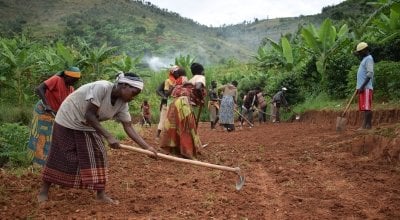
Knowledge Hub
Tackling Burundi’s malnutrition, one garden at a time

With the latest data from the 2017 Global Hunger Index showing that Burundi's levels of hunger are “extremely alarming” read about what Concern is doing about it, and how your donations are making a difference.
78% of Burundi’s population live in poverty and the country has one of the highest child mortality rates in the world. Over half of under-five deaths in Burundi are caused by preventable and treatable conditions like diarrhoea and malnutrition. The latest data available in the 2017 Global Hunger Index shows that levels of hunger are high and worsening each year.
Concern’s community-based solutions
The humanitarian situation in Burundi has been deteriorating with 1.76 million people not having enough food to meet their needs. Concern is on the ground helping families get a rich and varied diet from food they have grown themselves. This is done through kitchen gardens: vegetable patches designed to maximise the production of food throughout the year. These kitchen gardens help ensure children have a ready supply of healthy food all year round which particularly makes a vital difference for young children, supporting their physical and cognitive development.

Victoria’s kitchen garden
Without their kitchen garden, Victoria and her husband Bosco would have no reliable way to provide a healthy diet for their five young boys. Victoria’s kitchen garden allows her to supplement the diet of her whole family with a variety of fruit and vegetables. What’s more, having been trained in the nutritional benefits of different vegetables and food hygiene practices, she can ensure that her loved ones all remain well-nourished.

As well as taking care of her family, Victoria is committed to tackling malnutrition in her community. As a Care Group Volunteer, she works passionately helping mothers in her area to raise fit and healthy children. As well as offering guidance from her own experience, she screens for malnutrition, providing a frontline of defence for those at risk. For families like Victoria’s, kitchen gardens don’t just provide a crucial lifeline but also hope for the future.

Espérence’s kitchen garden
Mother of four Espérence Mutetiwabo and her husband Pascal were encouraged by Concern to build a kitchen garden to improve the nutrition of their children. They grow aubergines, sweet potatoes, amaranth, beans, cassava, mangoes, papaya, avocados and bananas on their plot of land, and have two goats.

My youngest daughter, Delphine, was sick. When Concern’s Community Health Worker visited us, he examined her and told me that she was malnourished. He proposed that I attend a Nutrition Session with other mothers. We cooked beans and ugali, and I learned to add some vegetables, ground nuts and small fish to make our meals more nutritious. I hadn’t been doing that up until then. I didn’t have the skills.
Since then, Delphine hasn’t suffered from malnutrition. Her previous malnutrition was caused by her not eating a diverse enough diet. Now the family eat the fruit they grow - mangos, papaya, avocados and bananas – rather than selling them.

The husband and wife team earn a living from tending their plot of land and kitchen garden, but occasionally need to look for casual work because they don’t know how well their crops will grow season to season.
We have to try and manage with what we have. We have to face up to the situation we find ourselves in.
Closer to home
Similar to kitchen gardens, here in the UK several hundred thousand people grow their own crops on allotments. These community plots have been in existence for many centuries, but the system we recognise today has its roots in the nineteenth century, when land was given over to the poor so they could more easily grow their own food. This was much needed due to the rapid industrialisation of the country and the lack of a welfare state. At the end of the First World War allotment land was made available to all, primarily as a way of assisting returning service men, as well as poor people.
These days, allotments serve more as a hobby but there are so many additional benefits to the fun pastime. They provide holders with exercise and healthy fruit and vegetables that are miles fresher than those on the supermarket shelves.
Linda’s allotment
Over 5,780 miles away from Esperance’s kitchen garden, Linda Gruchy has an allotment in Essex which she has been tending for the last four years. She has to travel about five miles from where she lives because her village doesn’t have allotments. In her plot she grows mainly fruit, beans, tomatoes, courgettes and other squash, and uses a Forest Garden approach - a productive, low-maintenance approach to gardening that incorporates trees, bushes and perennial plants. She is excited to have grown her first crop of apricots this year, telling us “they were wonderful.”

Linda decided to get an allotment so she could grow good produce herself. “I think bought produce lacks flavour and succulence.” As well as producing great tasting food for the table, she says having an allotment has made a difference to her life and her wellbeing by keeping her fit, and because it’s a good place to make friends.
Occasionally Linda’s daughter helps out, but jokes “so far, I’ve not seen much actual work from her. She does look after it whilst I’m away, but apparently that means going into the fruit cage for a very long time and exiting without much produce in the container!”

Her daughter loves raspberries and strawberries, which are expensive to buy so growing those saves money. Linda’s husband likes young carrots and when she has any excess crops, she gives them away.
I don’t want to waste any of it… I hate waste!
Tracey's allotment
About 100 miles down the road from Linda, Tracey West has had an allotment for nearly a year in a village near Basingstoke. She tends the plot with her partner and occasionally pays her grandchildren a little pocket money to help her graft.

Even though the plots were very overgrown when she first took them on, she ended up growing a large number of different squashes, peas, runner beans, butter beans, aubergines, peppers, chillies, cherry tomatoes, Swiss chard, potatoes, carrots, various herbs, kale, apples, pears, rhubarb and various berries – all in her first year!

Finding mass produced vegetables and fruit tasteless, and preferring to buy organic, she is now able to ensure she and her family are eating good quality, nutritious organic vegetables.
She said that they are now eating a greater variety of vegetables than when they bought from supermarkets and all the digging is certainly keeping her fit! Asked what her top tip is for anyone just starting out on a new plot she said “Go for it! There's a big sense of achievement to be had. Don't be afraid to experiment and don't fear failure. There's loads of help in books and on the internet… or other gardeners of course.”
From Basingstoke to Burundi, these growers have very different needs and lead very different lives. But they show how growing food is linked to empowering communities and people to ensure they can have a sustainable and healthy diet.






